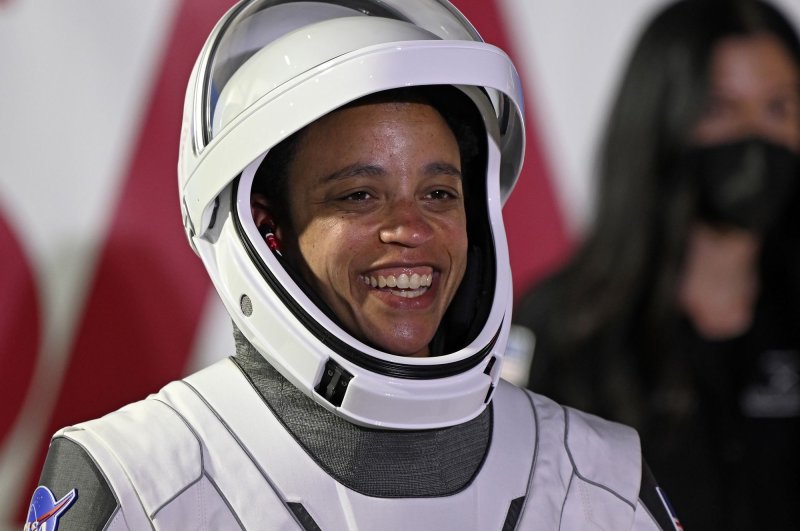1 of 3 | NASA astronaut Jessica Watkins poses for media and family members after walking out of the Neil Armstrong O&C Building at the Kennedy Space Center, Fla., on April 27. Photo by Joe Marino/UPI |
License Photo
NASA astronaut Jessica Watkins made history last month when she became one of the latest astronauts to come aboard the International Space Station.
Late last year, NASA announced Watkins would be assigned to the SpaceX Crew-4 mission, making her the first Black woman to live and work on the ISS. Watkins was first selected as an astronaut by NASA in 2017.
On a recent edition of AccuWeather Prime, Watkins told AccuWeather's Adam Del Rosso that she was honored to be part of the "long legacy of Black astronauts who have come before me."
"I think that it is an important tribute" to that legacy "as well as a testament to the exciting future ahead ... I'm just honored to be a small part of that legacy," Watkins told Del Rosso.
Watkins grew up in Lafayette, Colo., about 22 miles north of Denver, and developed a passion for space at a young age. She told Del Rosso that her interest in being an astronaut began around age 9 or 10.
"This has been a dream of mine for a pretty long time ... I never really thought that it would truly happen. So, just so lucky and blessed and honored to be here today," Watkins told Del Rosso.
![]() |
| Jessica Watkins talks with AccuWeather's Adam Del Rosso from the International Space Station. |
In college, Watkins studied geological and environmental sciences at Stanford University and earned a bachelor's degree. She then earned a doctorate in geology from the University of California, Los Angeles, according to NASA.
At UCLA, her graduate research project consisted of researching the emplacement mechanisms of large landslides on Mars and Earth. Watkins' first experience with NASA occurred when she became an intern working at the Ames Research Center in California in addition to NASA's Jet Propulsion Laboratory.
While training to become an astronaut, the crew of SpaceX Crew-4 had to endure frequent training to be ready to perform tasks while in space.
But it wasn't just physical training that the team had to learn.
"Lots of our other training involves systems and equipment, as well. So we learn about the systems of the International Space Station, where we are now, as well as the outside of the space station. So doing extra-vehicular activity training or spacewalk training in addition to our training on the SpaceX Dragon Vehicle," Watkins said.
The SpaceX Dragon Vehicle was the vehicle that brought Crew-4 to the ISS, and it will also be responsible for bringing the crew back to Earth after the mission is complete. Watkins, along with mission Commanders Robert Hines and European Space Agency astronaut Samantha Cristoforetti, launched to the ISS on April 27 from the Kennedy Space Center in Cape Canaveral, Fla.
![]() |
| Jessica Watkins tries on her equipment before going into space. Photo courtesy of NASA/Flickr |
The six-month mission involves conducting research on materials science, health technologies and plant science that will prepare for human exploration beyond low-Earth orbit, according to NASA. More than 200 science experiments and technology demonstrations will take place over the course of the mission.
As a geologist, Watkins told Del Rosso, she is very excited to be part of this crew.
"Being able to see the Earth from the perspective that the ISS offers, it's just really unique and really, really a very cool opportunity for a geologist like me. I really enjoyed being able to look out at the features and processes that we can see on Earth and, in particular, being able to apply those to planetary processes and features," she said.
While inside the ISS, Watkins said the crew is able to use Earth as an analog for what is seen on other planets, which helps the team learn more about those other worlds. The information can also be used to learn more about Earth.
In addition to its research goals, the crew also has to maintain physical health throughout the mission while aboard the ISS. The crew members use exercise equipment every day to help maintain their health and bone mass.
"The effects on microgravity on the human body can be significant. So we have these countermeasures in place," Watkins said.
The SpaceX Dragon Vehicle is expected to bring the astronauts from SpaceX Crew-4 back to Earth in September. The successor to that crew, SpaceX Crew-5, is expected to launch that same month.

















